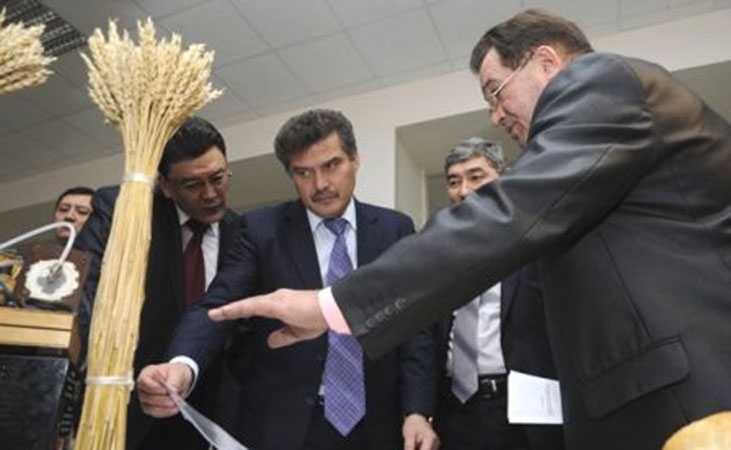Development and implementation of the credit education program
Preparatory stage.
Since 2001, in order to improve the quality of the learning process under the leadership of pro-rector for Academic Affairs, and new learning technologies Mayer F.F., the work began on the implementation and use of point-rating system of monitoring and evaluation of student learning, conduct of examinations by computer testing. With the participation of a number of teachers (Kuzhukeyev Zh.M., Koval A.P., etc.), there were worked out the principles and the basic elements of point-rating control, set out the organizational framework of the process, the procedure for filling the database and the use of current and boundary points when calculating the total control evaluation of the subject. There was developed and implemented a computerized system of semester student’s assessment and program of examination by computer-based testing (task assignment – Meyer F.F., software development – Konyushii V.I.). The system of test-examination of control in KSU already at that time allowed the use of different types of test items (including, open type – without response options, closed type with a choice of several correct answers), allow for the registration of level of difficulty of the questions, the selection of groups of multiple choice testing tasks, etc . Thereby, the university created a certain base for the implementation of the credit education program.
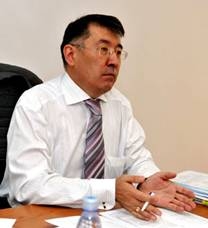
Since 2006-2007 academic year, more than 40 universities in the country, in accordance with the State Program of Education Development of the Republic of Kazakhstan for 2005-2010 and the Rules of the credit system of education in educational institutions, began widespread introduction of credit system (CSE) as an experiment. For our university it was not unexpected, since the widespread adoption of CSE in all specialties of the University was preceded by extensive preparatory work.
In A. Baitursynov Kostanai State University, the transition to the credit system of training was carefully prepared. In summer 2003, our teachers were trained in the basics of CSE in T. Ryskulov Kazakh Economic University, Kazakh Humanitarian and Law University and a number of other educational institutions of Kazakhstan. There were invited domestic and foreign experts, who had experience in the credit system. Heads of the departments, teachers and coordinator of academic affairs received a proper training. For example, S.M.Omirbaev, one of the developers of CSE in Kazakhstan (later – the director of the Department of Higher and Postgraduate Education MES) conducted a seminar on CSE for faculty for a week in October 2003. Start-up package of documents was studied and designed. Only after that, our university decided to join the experiment.
Introduction of CSE.
Since 2004, first as an experiment in the economic and law faculties, and then since 2006 in the whole university and on all forms of educational programs, they began to use the credit system of education.
Each university that implemented CSE became a testing ground for experiments across the country, and numerous conferences and forums sponsored by Ministry of Education allowed to determine the right decisions and to correct errors during an interesting and sometimes sharp dialogue. The complexity of the transition to the credit system was the lack of approved standards, norms and standards of the Ministry of Education and Science of the Republic of Kazakhstan, carrying out an experiment. Therefore, each university built its own model of the educational process, seeking to combine the learning of the student contingent both on the linear and the credit system.
Introduction of CSE required a significant change in the basic documents of higher school, so by the time of the transition to the credit system, there had been developed regulatory and reference documents, working curricula for all specialties, the necessary forms of individual educational plan, worked out the procedure of record of the students to elective subjects, etc.
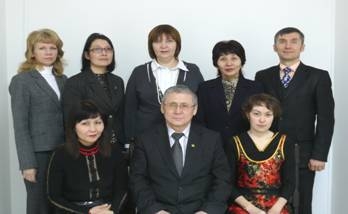
On the whole, the package of documents and deliverables for the transition A.Baitursynov KSU to the credit system, as noted in the conclusion of certifying commission of RK MES (December 2005), are at the level of the leading universities of the country. A computer accounting system of semester assessments, monitoring of learning achievements of students and examination by computer testing and application forms are one of the best in the country.
A great contribution to the development and implementation of the credit system of education at the university was made by Maiyer F.F. (pro-rector for Academic Affairs and NTO), Koval A.P. (in different years, the acting pro-rector for Academic Affairs and NTO, dean, head of the department), Chekhova T.I. (head of the educational and methodical department), N.K. Kubekova (Head of Registration Department), M.G. Tastanov (Head of Educational Department), the deans of the economic and legal departments Zhiyentaev S.M., Dauyenov M.Y., department chairs, departments faculty, conducting lessons on economic and legal professions.
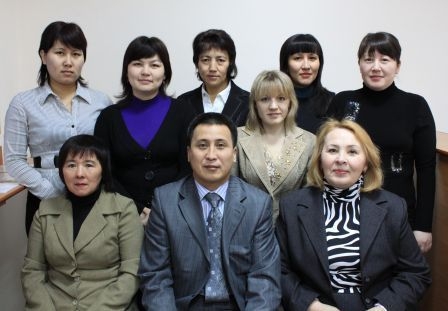
Credit system required a fundamental change in the approach to the long-established ideas about the role of higher school and the teacher in the learning process. In CSE the main task is to teach students to acquire knowledge independently, use the complete variety of information, gaining access to new knowledge. The restructuring of consciousness was not easy for the teachers, they did not always clearly perceived the principle of separation of learning process and knowledge control, the principle of election of teachers by students.
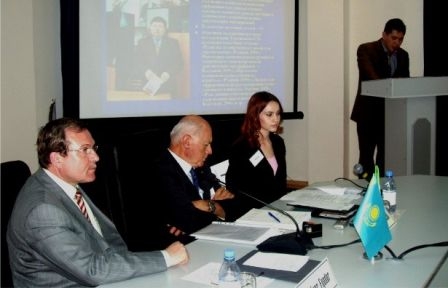 It was necessary to look for new approaches, methods, techniques, training, allowing students to express interest in the subject, to self-study it. And for this purpose since 2003, the university regularly held a variety of instructional seminars, open sessions using the latest learning technologies, strengthened customer feedback: their recommendations were taken into account in the development of the elective curricula, created branches of departments in enterprises and introduced new forms of practices, etc.
It was necessary to look for new approaches, methods, techniques, training, allowing students to express interest in the subject, to self-study it. And for this purpose since 2003, the university regularly held a variety of instructional seminars, open sessions using the latest learning technologies, strengthened customer feedback: their recommendations were taken into account in the development of the elective curricula, created branches of departments in enterprises and introduced new forms of practices, etc.
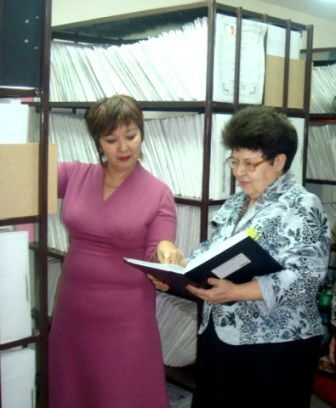
A particular attention in the university is paid to expanding and strengthening creative links with major educational and research centres in the near and far abroad, in particular, on the further improvement and development of the credit system in terms of organization and in terms of processing the content of educational programs in order to bring them in line with international standards and with the European system of credits. For example, from 2007 to 2009 KSU and the University of Bologna (Italy), Ostobortniya University (Finland), Abai University of International Business and KazNPU, participated in the development of international Tempus project "Implementation of the European credit transfer system in the universities of Kazakhstan." The project manager was F.F. Maiyer, the performers – Koval A.P., Chekhova T.I., etc. In another Tempus project in 2008-2010 (project manager – Doschanova A.I.), in collaboration with universities in Germany and Finland carried out the development of an international course "Innovation and strategic management of enterprise development" (the parent institution – Wismar University of Technology, Business and Design).
During the last decade under the leadership of pro-rector for Academic Affairs and NTO, the Center for Information Technology University (programmers Konyushii V.I., Bill O. V., Lata V.V., Shevtsov D.S.), carried out stepwise work to complete informatization of all areas of organizational, educational, methodical and other activities.

Between 2000 and 2008, corporate telecommunication network of the University was created from scratch, which linked together virtually all the management structure: administration, faculty, deans, department, offices and services, as well as computer training classes and information terminals. Basic processes of credit system were automated. A computerized system for the organization and support of the educational process was developed and implemented, including blocks of planning learning activities, conducting semester assessments, test-examination of control, created an internal web portal (www.ksu.ku). Availability of information and education portal, extensive corporate network of the university, which allows any computer an access to all information resources, created all necessary conditions for training highly qualified specialists. A great contribution to the establishment and development of a corporate computer network of the University and in the automation of all processes was made by the administrator of implementation of new learning technologies – Konyushii V.I.
The new phase of the introduction of credit technology
A new impetus to the improvement of credit technology (CTE) was given by the appointment of Nametov A.M., one of the developers of the system to ensure the quality of education in Kazakhstan, formerly Dean of Academic Affairs of the Kazakh National Agrarian University, a rector of A.Baitursynov KSU in January 2009. A number of the issues of planning and organization of the educational process in CTE were substantially revised, the university management, in particular management process, was restructured. On the basis of Educational Department, two new management departments were created – department of the planning and organization of the educational process (Head – Doctor of Philology Absadykov A.A.) and department of management and monitoring of education (Head – Candidate of Physical-Mathematical Sciences Tastanov M.G.) . The departments worked hard to improve the educational and methodical process under the credit program, the training of staff and faculty. The composition of the first department – Registry (head – Kubekova N.K.) and the office of student records (head – Mukatova A.O.). The composition of the second division – Department of management and monitoring of the quality of education (head – PhD Koval P.A.) and teaching department (head – PhD Chekhova T.I.). In accordance with the principles of the CTE, there was carried out the separation of functions between departments, deans and chairs.
management departments were created – department of the planning and organization of the educational process (Head – Doctor of Philology Absadykov A.A.) and department of management and monitoring of education (Head – Candidate of Physical-Mathematical Sciences Tastanov M.G.) . The departments worked hard to improve the educational and methodical process under the credit program, the training of staff and faculty. The composition of the first department – Registry (head – Kubekova N.K.) and the office of student records (head – Mukatova A.O.). The composition of the second division – Department of management and monitoring of the quality of education (head – PhD Koval P.A.) and teaching department (head – PhD Chekhova T.I.). In accordance with the principles of the CTE, there was carried out the separation of functions between departments, deans and chairs.
In general, it should be noted that the considerable experience of implementing the credit program, the organization of teaching work at the University was accumulated. On October 24, 2008 at a meeting of the educational and methodical National Council of RK MES at Al-Farabi Kazakh National University (the member of which is KSU) addressed the issue: "The modern university teacher: issues of professionalism and ethics" with the hearing of the materials of Kostanai State University as well. According to the decision of the meeting EMNC, all the institutions of the Republic were recommended to take note of and disseminate innovative experience of methodical work of A. Baitursynov Kostanai State University. The report "Improving the educational process through the application of innovative technologies in high school" (F.F.Maiyer, N.V.Bozhevolnaya, T.I.Chekhova) was received with interest by the EMNC members and was published in a thematic collection of the council "Modern higher school teacher: issues of professionalism and ethics "/ Ed. G.K.Ahmetova, comp. G.N.Parshina, A.K.Mynbayeva. – Almaty: Kazak universiteti 2008. -176 p. ISBN 9965-30-689-3.
Taking into account the high level of implementation of the credit program in A.Baitursynov Kostanai State University, the Ministry of Education and Science of Kazakhstan decided to hold the National Training Workshop "Improvement of the credit program at present: individual training and the role of students in the educational process" on the base of KSU from 17 to 18 November 2009.

The National training workshop was attended by over 200 people from more than 50 universities of the Republic. As part of the National Training Workshop, there was held an exchange of views, enthusiastic and useful discussion of the issues of individualization of learning and the role of students in the educational process, as well as the signing of the Memorandum of universities of Kazakhstan by 14 universities of the country.
Modern approaches
In recent years, the development of the credit program emphasis is focused on the development of educational programs based on the views of employers and the needs of the labour market, the construction of educational programs in a modular competency-based approach. The relationship with the companies is intensified.


Currently, the practice of employer participation in the educational activities of the university is rapidly expanding. Social partnership is realized in the framework of the Education Cluster. The successful development of mutual relations not only enabled the university to significantly increase the number of courses and programs offered by employers and practitioners, but also to take into account the needs and requirements of businesses and organizations with the introduction of new specializations and the opening of new educational programs based on competent approach.
The University has substantially changed technology of training, with primary emphasis on the formation of skills of the graduates for their success in their professional activities since the early days of the company. New methods and forms of work allow students to participate in processes of real production, as well as in the conduct of experimental design and research work together with teachers and specialists of enterprises.
New forms of organization of joint partnerships enable to attract employers to training to ensure not only the practical component of the educational process in the real world of modern manufacturing and material resources, but also improve the quality of education in general.
Today, employers are interested in training of highly qualified personnel are actively involved in developing the content and organization of the educational process, and address the issues of funding, pay tuition.
On June 6, 2012, the first Forum of KSU alumni was held, on December 7, 2012 with the participation of Akim of Kostanai Forum of KSU trustees and employers was held to discuss the issues of cooperation between all stakeholders of the market of skilled labour – government, education system, and business professionals themselves.
Such mutually beneficial cooperation of all participants in the labour market will make a breakthrough into a new quality of professional staff. And the main mechanism of this breakthrough should be a new system of training, based on the interaction of all the players in the market of skilled labour – the education system, professionals and businesses.
